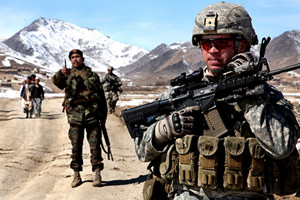America’s Forgotten War
Perhaps President Barack Obama should be thankful for the bad news—the oil spill, intractable unemployment and the rest—for it has definitely diverted attention from his biggest disaster: the Afghanistan war. Perhaps President Barack Obama should be thankful for the bad news, for it has definitely diverted attention from his biggest disaster: the Afghanistan war.
Perhaps President Barack Obama should be thankful for the bad news—the oil spill, intractable unemployment and the rest—for it has definitely diverted attention from his biggest disaster: the Afghanistan war.
So far, the distant war, fought by service volunteers and civilian contractors, can’t compete for attention in the media world. This may be good for Obama today. I doubt he wants a national debate on Afghanistan. But it’s bad for the country, and as it continues it will be bad for Obama, dragging him down as other senseless wars have done to his predecessors.
Casualties are rising, passing 1,000. The Afghanistan war’s cost in February alone was $6.7 billion, USA Today reported. At this rate, there may not be enough money to pay for the health care reform that Obama sees as his legacy.
Each week, I read the e-mailed report on news coverage produced by the Pew Research Center’s Project for Excellence in Journalism. It lists how newspapers, the Internet, network TV and cable TV played the news in the past week. For the week of May 17-23, Afghanistan was in seventh place in the overall standings. For newspapers, the war was 10th. It was seventh for online, sixth for network television and 10th for cable TV. Afghanistan coverage didn’t register for radio. The oil rig explosion, the 2010 elections, the economic crisis and the Mexican president’s Washington visit all occupied more space or time.
Actually, this was the war’s best showing for weeks. It didn’t make the top 10 in the preceding three weeks. Perhaps the number of war dead topping 1,000 prompted the interest. The New York Times noted the milestone in two pages of pictures of those killed since late July 2008, “Faces of the Fallen.” As James Dao and Andrew W. Lehren of the Times wrote, “Having taken nearly seven years to reach the first 500 dead, the war killed the second 500 in fewer than two. A resurgent Taliban active in almost every province, a weak central government incapable of protecting its people and a larger number of American troops in harm’s way all contributed to the accelerating pace of death.”
With the death toll rising and the number of Americans in Afghanistan increasing, why the poor coverage? I put the question to Tom Rosenstiel, director of the Project for Excellence in Journalism and my former colleague at the Los Angeles Times. What he had to say was enlightening but depressing.
“One factor is that, historically, if Americans—and the American news media is a reflection of them—have pressing domestic concerns … the domestic concerns seem to come out first,” he said.
“Interwoven with that is war fatigue,” he said. For seven years, the media and the public have focused on Iraq, and even there coverage has diminished. Another reason for the drop is that the mainstream news business is short of money and fearful of imminent extinction. Covering a war is expensive.
In addition, editors and other media managers don’t think people are interested. “The American media tends to mirror what they think the American people are thinking,” Rosenstiel said. Finally, there’s not much political debate over the war, and without controversy there’s not much interest on the blogs and among cable’s so-called analysts, who have become more influential than old-fashioned reporters.
The few prominent opponents and critics of the war can’t catch their attention.
Rep. Dennis Kucinich’s resolution for withdrawal from Afghanistan within 30 days was defeated in the House. Peace candidates in the current election campaigns, such as Marcy Winograd, who is running against Rep. Jane Harman in a Democratic primary in Southern California, are scarce.
And there has been minimal coverage of legislation requiring President Obama to develop a flexible timetable for withdrawing troops from Afghanistan, introduced by Sen. Russ Feingold, D-Wis., and Reps. Jim McGovern, D-Mass., and Walter Jones, R-N.C. Obama has said he wants to begin withdrawing troops in July 2011, but that obviously isn’t a firm enough promise for Feingold. The senator also disagreed with Obama’s goal of denying al-Qaida “a safe haven,” stopping Taliban advances and strengthening Afghanistan’s government. This made little sense to Feingold, who said, “A large open-ended expensive military presence in Afghanistan is not the way to defeat al Qaeda.” He inserted the Feingold-McGovern measure as an amendment to a spending bill, but it was voted down, 18-80. I’m sure you heard about it — if you watch C-SPAN.
Blind coverage by mainstream television and print helped get us into the Iraq war. So did acceptance, on the part of most politicians and a good segment of the public, of the lie that Iraq was somehow behind the Sept. 11, 2001, attacks. President George W. Bush was let off the hook for years.
Now mainstream television and print outlets are letting President Obama off the hook. An increasingly thin Afghanistan press corps is doing a heroic job. But too many news bosses, uninterested in the war, won’t play up the story. Bloggers, usually soloists, don’t have enough resources. As a result, there’s nobody available to save Obama from himself in this useless war.
Your support matters…Independent journalism is under threat and overshadowed by heavily funded mainstream media.
You can help level the playing field. Become a member.
Your tax-deductible contribution keeps us digging beneath the headlines to give you thought-provoking, investigative reporting and analysis that unearths what's really happening- without compromise.
Give today to support our courageous, independent journalists.









You need to be a supporter to comment.
There are currently no responses to this article.
Be the first to respond.